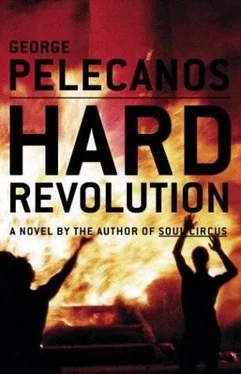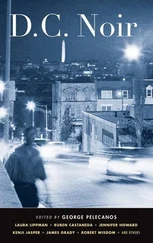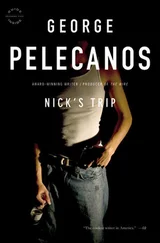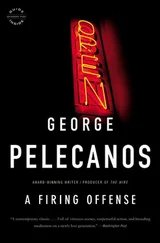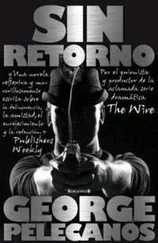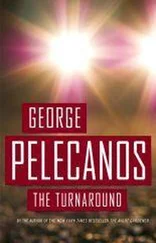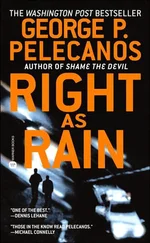She looked back into the house, then back at Vaughn. She rubbed her hands. He knew she had no understanding of search warrants. He knew she didn’t care for his “friends.” She’d help him if it meant helping her son.
“I’m gonna get the key for you now,” she said.
In the garage, Vaughn found a duffel bag holding boxes of shotgun shells and bricks of ammunition for a.45 and a.38. A half dozen shells and many of the bullets were missing from the boxes. A set of D.C. license plates that matched the plates registered to the Nova was lying on the workbench as well. Vaughn now surmised that the three men were out on the street, armed, in a car bearing phony plates, and about to commit a robbery.
He came out of the garage, removed his gloves, and thanked Angela Martini, who was standing in the driveway. He told her not to worry, that everything would be all right, her son would be fine. He said he would only be a moment longer here, and that she should go back into her house.
When she did, Vaughn radioed in an all-points bulletin on Dominic Martini’s Nova, plate number unknown, along with an armed-and-dangerous description of Martini, Stewart, and Hess. He cradled the mic in his unmarked and walked back to the squad car.
“You guys sit tight and keep an eye on these vehicles,” said Vaughn to Officer Mark White.
“You leavin’?” said White.
“Gonna cruise around some,” said Vaughn. “See if I run into the owners of these cars.”
DEREK STRANGE AND Troy Peters came out of the precinct house on Nicholson in uniform and picked car number 63 for their shift. They pulled out of the station’s horseshoe-shaped driveway, going by Vaughn’s Polara, parked in a patch of dirt.
Peters went up 13th, passing Fort Stevens, and at the Piney Branch-Georgia intersection turned right, circling the Esso and American stations there. They were working the APB. Strange had recognized Martini’s name and told Peters to drive by the station.
“Nothin’,” said Peters. “You know one of those guys, right?”
“Same one I was telling you about the other day,” said Strange. “We saw him arguing with that big man, right there by the pumps.”
“Report said they’re wanted on a hit-and-run homicide. Think he’s right for that?”
“I don’t know. I don’t know anything about him anymore. I didn’t really know him then.”
“I’m gonna cruise up to the District line,” said Peters. “We’ll turn around up there and do the north-south run.”
Peters kicked it coming out of the turn at Tuckerman. They went along past the Polar Bears ice cream and the Hubbard House. Strange could almost taste the sugar in the layered chocolate pie, see his father carrying that white box across the street, late on Saturdays, when they’d bring it home together to share with his mother and Dennis.
“You okay?” said Peters.
“Just thinking on something is all.”
“I mean your hand.”
Strange looked at his right hand, resting on his thigh. His knuckles, pink against his dark brown skin, were still showing a little blood. He’d cleaned the scrape but not covered it, not wanting to bring attention to the injury, not wanting anyone to tell him he couldn’t work. He needed to go to work.
“I punched a wall,” said Strange.
Peters looked him over. “It’s gonna be rough for a while.”
“Feels like it’s always gonna be.”
“Anything on the investigation?”
“No.”
Up past Aspen Street, they went by the Walter Reed Army Medical Center, and then a mix of low-rise commercial and residential structures. Peters accelerated as the squad car hit a long grade.
“I talked to your mother yesterday,” said Peters, side-glancing Strange. “Nice woman.”
“None better.”
“I mentioned her job in the dentist’s office.”
“That right.”
“She didn’t know what I was talking about. Told me she’d been working as a domestic most of her adult life.”
“You got me, Troy,” said Strange unemotionally. “You caught me in a lie.”
“Question is, why’d you feel like you had to tell me that story?”
“I wasn’t ashamed of my mother, if that’s what you think. I’m proud of her, understand?”
“What, then?”
“It was all about me. Me, with nothin’ in my background but a high school degree, riding with a Peace Corps and Princeton man. By elevating her, I was trying to elevate myself. Once I told it that way, it was too late to tell it true.”
“I ever try and make you feel small?”
“You never did.”
“Where you think I come from, Derek?”
“Money, I expect.”
“You mean you assumed.”
“That’s right.”
“I come from dirt. That’s all I’m gonna say, because you don’t want to hear it. But to have a family like yours… Look, I was envious of you. Didn’t matter to me what your parents did for a living. Point is, they were there for you. Not like mine.”
“I didn’t know.”
“You never asked me,” said Peters. “You weren’t interested.”
Strange didn’t offer any kind of rebuttal, because Troy was right. When he looked at Peters, he saw a white man first and a man second. As far as getting underneath the surface of his partner and looking at his heart, Strange had not been interested. Knowing all the while it was the same way many white men looked at him.
“I apologize,” said Strange.
“Forget it,” said Peters.
Strange and Peters relaxed their shoulders and said nothing further. The silence was not uncomfortable.
A quarter mile ahead, on the left, stood the Morris Miller’s liquor store. On the right sat a shopping center, bookended by an A amp;P supermarket on one end and, on the other, the Capitol Savings and Loan.
WAIT FOR A spot out front,” said Stewart. “There,” said Hess from the backseat. “Money says the old lady’s gonna get in that Buick.”
“That ain’t no surprise,” said Stewart. “She pulls away, back this race car in, Dom.”
“Right,” said Martini, his lifeless eyes tracking the elderly woman emerging from the bank and walking to her Skylark, parked in a space out front.
They were in the idling Nova, fitted in a slot at the far corner of the A amp;P portion of the lot. The center was only half filled with cars, as this was the time of day during which mothers were typically home awaiting the arrival of their children from school. A woman got out of her station wagon with her toddler, found a shopping cart that had been abandoned, and pushed it with one hand toward the supermarket, her left hand pulling on her child’s sweater. A man with a flattop haircut carried paper bags from the market to his Olds, a lit cigarette dangling from his lips.
Buzz Stewart and Walter Hess wore their raincoats over blue jeans, Dickie work shirts, and black bomber-style boots. Their stocking masks and gloves sat in their laps. Both had loaded and holstered their weapons. Additonal loose shotgun shells and revolver rounds sat in the side pockets of their raincoats. Martini’s.45 rested on the bucket between his legs, steel grip out, the barrel pressing against his genitals.
Hess found a Black Beauty among the bullets in his pocket and pulled it free. Hunched in the backseat, he drew one of his.38s and ground its butt into the pill, which he held in the palm of his callused hand. The pill broke into bits and dust. Hess reholstered his gun, leaned forward, put his face into his palm, and snorted the amphetamine.
“ Fuck, yeah,” said Hess, throwing back his head, feeling the burn in his nasal passages and a bright burst behind his eyes.
“Go on, Dom,” said Stewart. “Take the space.”
Читать дальше
